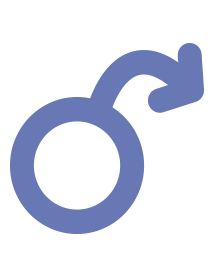Do you find yourself wearing out earlier in the day than you used to? Maybe you feel drained all the time, but you just shrug it off, thinking it’s a natural part of getting older. Or perhaps your belt size has gone up a few notches — and again, you chalk it up to aging.
Sure, everyone goes through a low-energy moment or two, and there are a lot of reasons you might gain weight (including the classic ones like eating too many calories and not burning enough off). And many men do indeed experience fatigue and weight gain, especially around the belly, as they age. But neither of these are symptoms you have to take as a given.
In many cases, both the fatigue and the weight gain that come with aging are a result of hormonal changes happening in your body. These health issues can even be related to one another, even though they seem so different. If weight gain (or the inability to lose weight no matter how hard you try) and loss of energy are plaguing you, keep reading to learn the causes and what you can do to bring energy back into your life.
Hormonal Changes That Occur With Age
As men get older, their testosterone levels drop by an average of 1% per year, starting in their 30s. While you may think of testosterone as the hormone that fuels your sex drive and sexual performance (and it certainly does that!), it’s also key to maintaining a healthy weight. When you’re younger, testosterone binds to fat to help move it out of your system, it speeds up your metabolism so you burn more calories, and it helps build muscle. As those testosterone levels drop with age, though, your body begins to hang on to fat, especially around your belly.
Human growth hormone (HGH) also begins to decline as you age, typically beginning in your 40s. This vital hormone boosts your energy and your sexual performance. It also helps you get restful sleep and keeps your bones strong. As you age, the decreased production of HGH can result in a loss of muscle mass. Without your muscles burning as much glucose, your body starts to turn excess glucose into fat, storing it around the middle of your body and leading to the pouch that many men start to carry as they get older.
Low Testosterone Levels, Aging, and Fatigue
That decrease in testosterone that occurs naturally as you age has an effect across many systems in your body, including your energy levels. The fatigue you may experience can be exacerbated by other symptoms resulting from low testosterone, including insomnia and lack of sleep. And since your body produces hormones primarily at night, if you don’t sleep well, your testosterone levels may drop even more, compounding the issues.
Loss of energy and fatigue are among the key signs of testosterone deficiency. Related to them are loss of muscle strength. When this occurs, exertion can make you feel even more tired. You may notice that your recovery time after a good workout is getting longer, or you may just feel exhausted after exercise. In addition, as you get more tired, you may start to find that your brain is also feeling fatigued, resulting in memory issues and loss of concentration.
Other Causes of Fatigue and Low Energy
Testosterone deficiency is not the only cause of fatigue, of course. If you’re experiencing low energy levels and tiredness on a regular basis, your doctor may want to test for the following potential causes:
- Hypothyroidism: Your thyroid gland, which produces other hormones needed to keep energy levels high, can be hindered by various autoimmune conditions, and it may also contribute to low testosterone levels.
- Anemia: Fatigue is one result if your blood’s iron levels are low, something that can occur as a result of too much blood donation, a vegetarian diet, or internal bleeding.
- Sleep problems: If you don’t sleep well, perhaps due to sleep apnea, restless leg syndrome, or another sleep disorder, you’re likely to feel fatigued on a regular basis.
- Depression: Six million men experience depression each year, with fatigue and decreased energy showing up as symptoms alongside hopeless feelings, lack of interest in anything, and difficulties with mental focus.
- Poor nutrition: Your body needs certain nutrients to repair itself and keep your energy levels high; if you don’t get these nutrients, fatigue can be a result.
- Lack of exercise: It may seem counterintuitive to point to lack of exercise as a cause of fatigue, since exercising can certainly wear you out, but if you’re not exercising, your muscles may start to atrophy and you may not sleep well at night.
- Significant health conditions: Problems with your heart, lungs, liver, or kidneys can result in fatigue, as can cancer, chronic fatigue syndrome, and diabetes.
When to See a Doctor About Fatigue
Because fatigue can be a sign of a serious medical condition, it’s always a good idea to see a doctor when you experience extended periods of fatigue. Your doctor may determine that your problem is a result of poor diet, poor exercise, or poor sleep — but they may also find that your fatigue is a symptom of something more serious. If you’re practicing healthy habits and still feeling exhausted on a regular basis, it’s time to make an appointment.
Aging, Low Testosterone Levels and Weight Gain
Fatigue isn’t the only sign of aging that may seem inevitable. Many men also experience significant weight gain as they age. While a sedentary lifestyle certainly can contribute to the appearance of fat around the waistline, it’s far from the only factor involved. That gradual loss of testosterone beginning in your 30s is also a key element in midlife weight gain. Decreased levels of testosterone mean a slower metabolism and a drop in muscle mass, resulting in extra weight.
How to Fight Back Against Midlife Weight Gain
Fighting back against that insidious weight gain is never easy, but there are many steps you can take to make it happen. Healthy eating is one key habit to practice. As you eat more protein, you build the muscle mass that you tend to lose with age. On the flip side, staying away from refined carbohydrates can also help you stem weight gain. Whole grain and fibrous carbs, in contrast, release glucose more slowly, so you don’t gain as much weight.
Exercise will also help you push back against midlife weight gain. Resistance training will help build muscle tissue — and the more muscle you have, the more calories you burn, helping keep weight under control. Strength training also helps build your production of HGH and diminishes your production of cortisol, the stress hormone. Looking for ways to stay active in your everyday life, such as working at a standing desk, taking the stairs whenever possible, or parking at the far end of every parking lot, will also help you burn calories.
Reducing stress in your life also can help you stay healthy and fit. When you’re stressed, your body produces more cortisol, which has been linked to fat accumulation around the waist. Turning to stress reducers such as yoga or mindfulness can make a real difference.
Of course, sometimes your own efforts aren’t enough. Many men find that they need to seek medical support to deal with the underlying physical conditions that are prompting their weight gain. Those hormonal issues become super important here. Low testosterone levels can be a key contributing factor to midlife weight gain, as can a decrease in the amount of HGH hormones your body is producing. When you get the levels of these key hormones checked and start supplementing with testosterone or HGH peptides, you may find that your entire body starts to feel stronger, less fatigued, and healthier once again.
Other Effects of Low Testosterone
If you’re dealing with testosterone deficiency, you may notice symptoms far beyond just weight gain and fatigue. That’s because testosterone levels affect many areas of your body and your life. The most obvious is your sex life. If your testosterone levels are low, you may notice a distinct drop in your sex drive, and you may also experience erectile dysfunction.
In addition, your brain may show the effects of low testosterone. You may find it difficult to concentrate or stay focused, and you may even experience some memory issues. In addition, many men with low testosterone experience depression, mood swings, and irritability, in addition to a loss of motivation and drive.
Bone density also suffers if you have low testosterone levels, though you may not be aware of this issue until you have the right medical test performed (or until you break a bone). Insomnia also plagues many men with low testosterone.
We Can Help You Push Back Against Aging
That fatigue you’re feeling and the weight gain you’re experiencing are connected to each other. But that’s good news, in a way, because it means that if you treat the root cause, you’ll see both issues start to diminish. For many men, testosterone replacement therapy and treatment with HGH peptides makes all the difference.
At Texas Men’s Health Group, we focus on optimizing your hormones so you can push back against aging. With our expert treatments, delivered by one of the pre-eminent urologists in the Dallas area, you can restore the vigor and well-being of your younger days. Finding out that there’s a medical reason for your fatigue and weight gain can be immensely freeing, opening the door to a level of health and well-being you thought you might not experience again. Contact us today to see how we can help you fight the symptoms of aging — because fatigue and weight gain don’t have to be the new normal.


